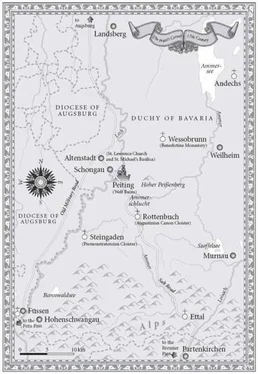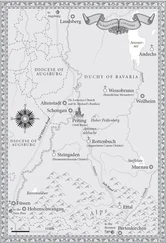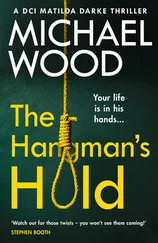Oliver Potzsch - The Hangman’s Daughter
Здесь есть возможность читать онлайн «Oliver Potzsch - The Hangman’s Daughter» весь текст электронной книги совершенно бесплатно (целиком полную версию без сокращений). В некоторых случаях можно слушать аудио, скачать через торрент в формате fb2 и присутствует краткое содержание. Жанр: Исторический детектив, на английском языке. Описание произведения, (предисловие) а так же отзывы посетителей доступны на портале библиотеки ЛибКат.
- Название:The Hangman’s Daughter
- Автор:
- Жанр:
- Год:неизвестен
- ISBN:нет данных
- Рейтинг книги:5 / 5. Голосов: 1
-
Избранное:Добавить в избранное
- Отзывы:
-
Ваша оценка:
- 100
- 1
- 2
- 3
- 4
- 5
The Hangman’s Daughter: краткое содержание, описание и аннотация
Предлагаем к чтению аннотацию, описание, краткое содержание или предисловие (зависит от того, что написал сам автор книги «The Hangman’s Daughter»). Если вы не нашли необходимую информацию о книге — напишите в комментариях, мы постараемся отыскать её.
The Hangman’s Daughter — читать онлайн бесплатно полную книгу (весь текст) целиком
Ниже представлен текст книги, разбитый по страницам. Система сохранения места последней прочитанной страницы, позволяет с удобством читать онлайн бесплатно книгу «The Hangman’s Daughter», без необходимости каждый раз заново искать на чём Вы остановились. Поставьте закладку, и сможете в любой момент перейти на страницу, на которой закончили чтение.
Интервал:
Закладка:
Simon gave the man in front of him a defiant stare. The tanner shrugged, then turned to walk away. Over his shoulder he cast a disparaging glance at the physician.
“All right, come along then, if it isn’t too late already.”
Hurriedly, Simon followed the man and entered Munzstrasse along with him. It was the day after Saint George’s, and most tradesmen had already opened their first-floor shops hours ago. Saint George’s Day was also when maids and farmhands entered service on the farms surrounding Schongau. Accordingly, a great number of people were already about in the streets. On the left, clanging noises emerged from the blacksmith’s shop where an alderman’s horse had just been shod. The butcher next door had just slaughtered a pig, and thin rivulets of blood were trickling between the cobblestones, so that the physician had to step over them with one long stride in order not to soil his new leather boots. A few yards farther, a baker was selling fresh bread. Simon knew that it must be full of husks and would crunch between the teeth when you chewed it. Only the aldermen could afford real white bread these days, and only on special holidays.
And yet, Schongauers had to be glad to have anything to eat at all in that eleventh year after the end of the Great War. In the last four years, crops had twice been practically annihilated by hailstorms. In May of last year, a terrible rainstorm had caused the Lech to flood, and the town mill had been washed away. Since then, Schongauers had to take their grain to Altenstadt or even more distant towns to be ground, which, of course, was more expensive. Many fields in the nearby villages were left fallow, and farms lay abandoned. A third of the population had died of the plague or hunger in the past decades. Those who could, kept livestock in their houses and lived on cabbage and turnips from their own kitchen gardens.
As they crossed the market square, Simon cast a glance at the Ballenhaus. It used to be a warehouse and now served as a town hall and council chamber. It had once been the pride of the town when Schongau was rich, on a par with towns like Augsburg, and the wealthiest and most powerful merchants in the Holy Roman Empire had come and gone there. The little town on the Lech, where ancient trade routes intersected, was once an important trading place for all sorts of goods. But the war had put an end to all that. The Ballenhaus was in a state of decay: plaster was crumbling off the walls, and the entry gate hung crooked on its hinges. This time of murder and robbery had made Schongau poor. What had once been a rich, handsome town in the Pfaffenwinkel part of Bavaria had become a camping ground for unemployed mercenaries and other vagrants. After the war came famine, disease, cattle plague, and hailstorms. The town was finished, and Simon didn’t know if it could pull itself together one more time. And yet the burghers had not given up. On his way through the Lech Gate going down to the river, Simon looked at a colorful hustle and bustle. Wagon owners were driving their ox carts up the steep incline toward the market square. Over in the tanners’ quarter, the chimneys were smoking, and down by the riverbank women were busy with their washing, emptying troughs of dirty water into the raging Lech. Schongau, high on its hill, was enthroned above the forests and the river, peering almost like a proud matron toward Augsburg, its older and more powerful sister. Simon had to smile. No, this city would not go under. Life went on, despite all the dying.
At the landing, a large crowd had assembled.
Simon heard murmuring voices and again and again the laments of a man. He crossed the bridge and turned to the right, toward the storage shed, which was built right against the pier. With some difficulty he pushed himself through the throng until he reached the center of the crowd.
The wagon driver Josef Grimmer was kneeling on the wet planks, bending over a blood-smeared mass. His broad back blocked Simon’s view. Simon put his hand on Grimmer’s shoulder and felt that the man was shaking. His face was stained with tears, and he was deathly pale. Only some time later did the man notice the physician behind him.
His voice cracked as he hurled his curse in Simon’s face. “Look what they’ve done to my son! They stuck him like a pig! I’ll kill them! I’ll kill them all!”
“Who?” Simon asked softly. But the wagon driver had turned to his child again, sobbing.
“He’s talking about the Augsburg wagon men,” a man near him murmured. Simon recognized him as a member of the wagon drivers’ guild.
“There’ve been quarrels with them lately,” the man continued, “because they had to hand over their loads to us. They say we’d put some of the cargo aside for ourselves. Josef has picked a fight with those up there at the Stern.”
Simon nodded. He had had to bandage a few broken noses himself after the brawl at the inn. Many fines had been imposed, but that only increased the hatred between the wagon drivers of Augsburg and those of Schongau. There was an ancient ducal ordinance that the Augsburgers were permitted to transport cargo from Venice or Florence only as far as Schongau. From there, the Schongauers were to take over. This transportation monopoly had long been a thorn in the flesh of the Augsburgers.
Gently, Simon led the grieving father to the side. Some of his friends from the wagon drivers’ guild joined him. Then he bent over the boy.
So far nobody had bothered even to remove the child’s wet shirt. Simon ripped it open, revealing a ragged landscape of stabs. Someone must have slashed at the boy in an insane rage. Light-red blood was oozing from a fresh, sizable cut at the back of his head. Simon assumed that the boy had been trapped between the floating logs. His face was black-and-blue, but that, too, could have been done by the logs. The gigantic trunks developed a tremendous power in the stream and could crush a person like a piece of rotten fruit.
Simon put his ear to the boy’s chest. Then he took a small mirror and held it under his broken, blood-smeared nose. No breath was to be seen. The boy’s eyes were wide open. Peter Grimmer was dead.
Simon turned to the bystanders, who were watching him in silence. “A wet cloth,” he demanded.
A woman handed him a linen rag. Simon dipped it in the Lech and wiped the boy’s chest clean. When he had washed off all the blood, he could count seven stabs, all of them around the heart. But despite the deadly wounds, the boy hadn’t died at once. Gabriel the tanner had told Simon on their way down to the landing that the child had been murmuring to himself until just a short while ago.
Simon turned the boy on his belly. With a vigorous tug he ripped open the shirt on the back as well. A groan went through the crowd.
Beneath one shoulder blade there was a palm-size sign of a kind that Simon had never seen before-a washed-out purple circle with a cross protruding from the bottom:

For a moment, there was total silence on the pier. Then the first screams rose. “Witchcraft! There’s witchcraft involved!” Somebody bawled: “The witches have come back to Schongau! They’re getting our kids!”
Simon passed his fingers over the sign, but it couldn’t be wiped off. It reminded him of something, but he couldn’t tell what it was. Its dark color made it look like a demonic sign.
Josef Grimmer, who until then had been leaning on a few friends, staggered toward the corpse of his son. He regarded the sign briefly, as if he couldn’t believe what he saw. Then he shouted to the crowd, “He has that from the Stechlin woman! The midwife, the witch! She painted that on him! She killed him!”
Simon remembered that lately he had indeed seen the boy at the midwife’s place several times. Martha Stechlin lived up at the Kuh Gate right next to the Grimmers. Ever since Agnes Grimmer had died in childbirth, the boy had often turned to her for consolation. His father had never forgiven Stechlin for failing to stop his wife’s hemorrhaging. He held her responsible for his wife’s death.
Читать дальшеИнтервал:
Закладка:
Похожие книги на «The Hangman’s Daughter»
Представляем Вашему вниманию похожие книги на «The Hangman’s Daughter» списком для выбора. Мы отобрали схожую по названию и смыслу литературу в надежде предоставить читателям больше вариантов отыскать новые, интересные, ещё непрочитанные произведения.
Обсуждение, отзывы о книге «The Hangman’s Daughter» и просто собственные мнения читателей. Оставьте ваши комментарии, напишите, что Вы думаете о произведении, его смысле или главных героях. Укажите что конкретно понравилось, а что нет, и почему Вы так считаете.











